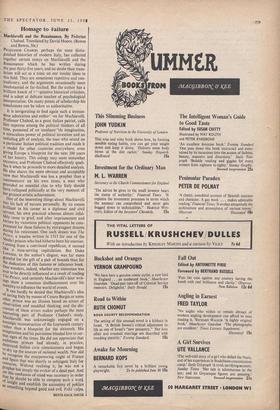Homage to Failure
PaoyEssott CHABOD, perhaps the most distin- guished historian of modern Italy, has collected together certain essays on Machiavelli and the Renaissance which he has written during the past thirty-five years, and no doubt their trans- lation will act as a tonic on our insular ideas in this field. They are sometimes repetitive and con- tradictory, and the arguments occasionally seem insubstantial or far-fetched. But the author has a
brilliant knack of ginative historical criticism, and is adept at delicate touches of psychological interpretation. On many points of scholarship his conclusions can be taken as authoritative.
It is invigorating to find again such a tremen- dous admiration and enthue'sm for Machiavelli. Professor Chabod, as a good Italian patriot, calls him supreme among the political thinkers of all time possessed of an inexhaus'ble imagination, a miraculous power of political invention and an Unfailing gift of analysis, the man who seized on a particular Italian political tradition and made it a model for other countries everywhere, even giving Europe a blueprint for the next 200 years of her history. This eulogy may seem somewhat excessive, and Professor Chabod effectively quali- fies it when he proceeds to more detailed analysis. He also shares the more obvious and acceptable view that Machiavelli was less a prophet than a commentator on his own times, a man who Provided an essential clue to why Italy should have collapsed politically at the very moment of her greatest artistic achievement.
One of the interesting things about Machiavelli Was his lack of success personally. By no means brilliant in his career as a diplomat and civil servant, his own practical schemes almost infal- liblY came to grief, and after imprisonment and torture by victorious political opponents he com- pensated for these failures by extravagant dreams during his retirement, One such dream was The Prince, a treatise written in 1513 for one of the Medici princes who had hitherto been his enemies.
Ike a time-serving capitulation. But Duke Lorenzo, to the author's disgust, was far more grateful for the gift of a pair of hounds than for the dedication of this famous or infamous book. °Ile wonders, indeed, whether any statesman was ever to be directly influenced as a result of reading The Prince, and certainly Machiavelli's later writ- ings show a conscious disillusionment over his inability to influence the world of events. It can hardly be denied that Machiavelli's idea of saving Italy by means of Cesare Borgia or some ether prince was an illusion based on errors of observation and muddled thinking, and the dis- cussion of these errors makes perhaps the most interesting part of Professor Chabod's study. Machiavelli was unknowingly engaged on a nostalgic reconstruction of the fourteenth century rather than a blueprint for the sixteenth. His Imagination and his patriotism blinded him to cer- _ain signs of the times. He did not appreciate that a_Mbitious princes had already, in practice, destroyed Italian civic consciousness and begun lo dry up the sources of national wealth. Nor did he recognise the overpowering might of France centuries. Spain that was shortly to subjugate Italy for
nturies. Without realising it, he was not a Yet
prophet but simply the evoker of a dead past. And y. atthis confusion of mind was necessary in order 1_11, he should be able to compose such a work insight and establish the autonomy of politics as something beyond good and evil. Felix culpa.
DENIS MACK SMITH


































 Previous page
Previous page